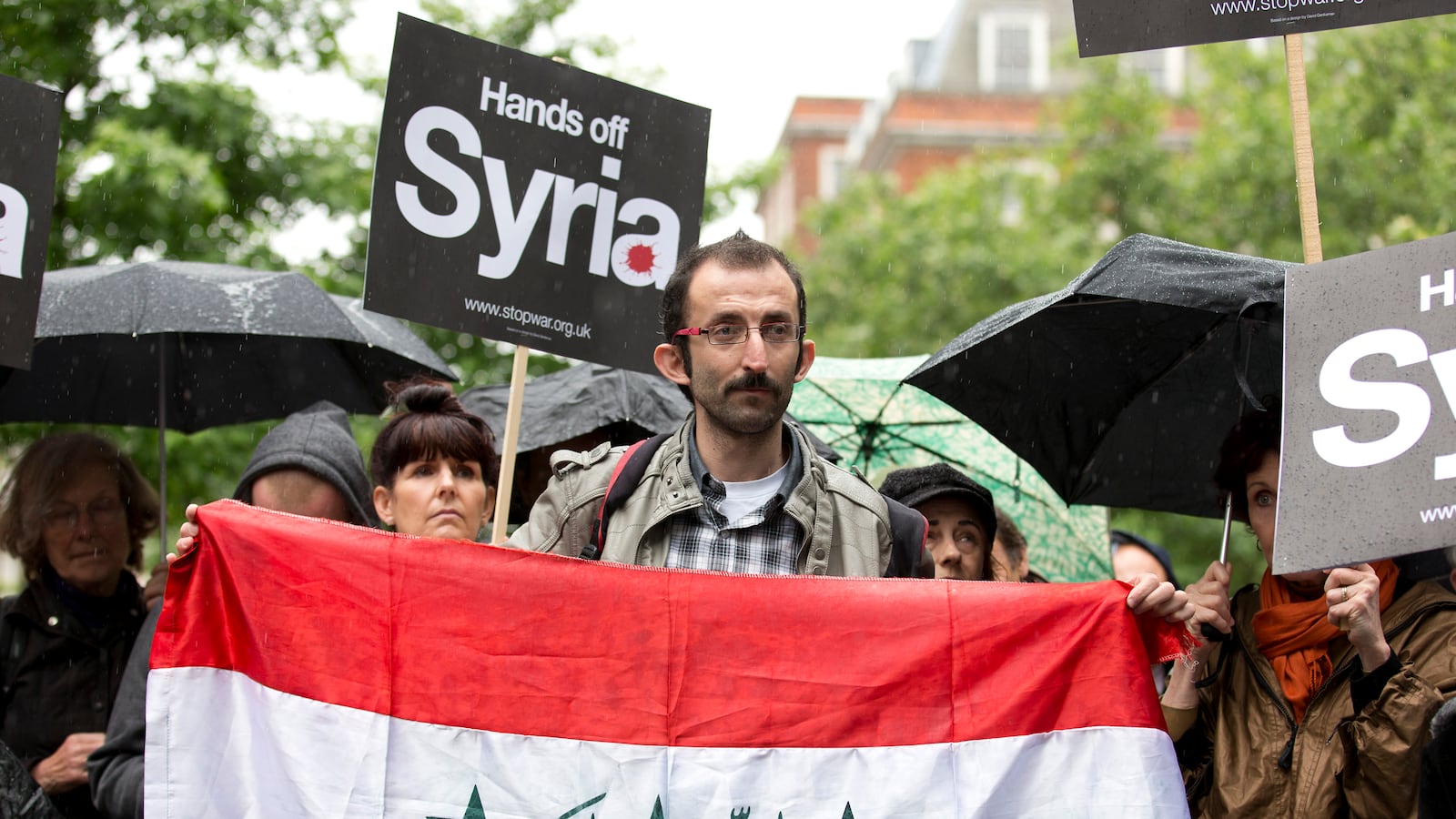On Thursday night, when Deputy National Security Adviser Ben Rhodes was announcing that the U.S. now believes Syria’s government has used chemical weapons against its people, President Obama was in the East Room of the White House, being introduced by two third graders at an event marking Gay Pride Month. On Friday, when Rhodes confirmed that the Obama administration would begin sending Syria’s rebels small arms, Obama was in the East Room yet again, celebrating Father’s Day with students from Chicago taking part in the “Becoming a Man” program.

Don’t get me wrong. I’m all for celebrating LGBT rights and helping inner-city kids learn about fatherhood. But this is no way to begin a war.
I say “begin a war” because if there’s one thing on which supporters and critics of military intervention in Syria agree, it’s that sending small arms won’t change much. “How can small arms make a difference?” asked Louay al Mokdad, political and media coordinator for the Free Syrian Army. “They should help us with real weapons, anti-tank and anti-aircraft, and with armored vehicles, training, and a no-fly zone.” John McCain added, “Every bone in my body knows that simply supplying weapons will not change the equation.” C.J. Chivers, who is covering the war for The New York Times, agreed that “small arms won’t change the current dynamic.”
By sending small arms, the Obama administration has now hitched its own political fortunes more tightly to those of Syria’s rebels. And if, as most expect, Washington’s rifles don’t turn the tide, Obama will find it harder to resist stronger military action than he would have had he not gone down this path to begin with. Already the U.S. is moving warplanes and antimissile systems to Jordan. Once there, the pressure to use them will only grow.
All this might be defensible if the president were telling Americans that we have grave national and moral interests at stake in Syria. And if he was prepared to make deposing Bashar al-Assad and ending Syria’s civil war a primary focus of his second term. But that’s exactly what he’s not doing. It’s not just that Obama left Ben Rhodes to make the announcement about small arms. Rhodes also hung the shift in U.S. policy on a new U.S. intelligence assessment that Assad has used chemical weapons. That’s a pretty thin reed. For starters, it’s not clear U.S. intelligence is that strong. On Thursday Rhodes noted, “We are working with allies to present a credible, evidentiary case to share with the international community and the public”—thus conceding that the administration hasn’t presented one yet. Rhodes said the U.S.—which has no investigators on the ground in Syria—had made its own assessment because a United Nations “investigation [is] being frustrated by the failure of the Assad regime to cooperate and provide the necessary access.” Assad may well bear the blame for the U.N.’s failure to do an adequate investigation, but that doesn’t change the fact that, as Secretary-General Ban Ki-moon was quick to note, the U.N. doesn’t currently share America’s assessment. Especially after Iraq, skeptics will also find it suspiciously convenient that Team Obama announced its new intelligence on chemical weapons just days after Bill Clinton ratcheted up domestic political pressure by publicly calling out the president for not doing more in Syria.
And even if the Obama administration’s claims about chemical weapons use are correct, they’re not the reason to intervene. As Rhodes himself conceded, chemical weapons have killed perhaps 100 to 150 Syrians in a civil war that has claimed more than 90,000. The best rationales for intervention in Syria are preventing mass slaughter, preventing the war from engulfing Syria’s neighbors, and weakening Hezbollah and Iran. Chemical weapons aren’t near the top of the list.
When it comes to military intervention, Obama is the anti-Bush. Dubya had too much conviction; he has too little. As Bob Woodward has detailed, Obama had grave doubts about his plan to send 30,000 more troops to Afghanistan in 2009. But he went ahead with it under pressure from Joint Chiefs chairman David Petraeus and Defense Secretary Robert Gates, who Obama feared might resign if he sent a smaller force. On Afghanistan, Obama was lucky. By the time the surge was over, the pressure for victory in Afghanistan had dissipated, and he didn’t pay a political price for having approved a military escalation that many in his administration—perhaps including him—doubted could succeed.
On Syria, I doubt he’ll be so lucky. Absent some marked military or diplomatic shift in America’s favor, elite pressure for costlier, riskier U.S. intervention will likely grow. All the public evidence suggests Obama doesn’t want that. He wants to be Dwight Eisenhower, the president who by avoiding expensive military entanglements rebuilt the economic foundation of American power. But if Obama considers deeper intervention in Syria a threat to that strategic vision, he needs to start saying so, loudly. If he’s changed his mind, and now believes it’s worth expending energy he’d rather expend domestically, and money America doesn’t have, to stop Syria’s civil war, he needs to say that too. He needs to rally a reluctant public for the more costly forms of military intervention that a decent diplomatic deal will almost certainly require.
What he must not do is pursue half-hearted policies he doesn’t truly believe in while trying to focus his attention elsewhere. Even with energy and conviction, Obama’s Syria policy could still fail. Without it, failure is almost guaranteed.





